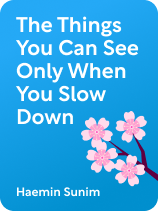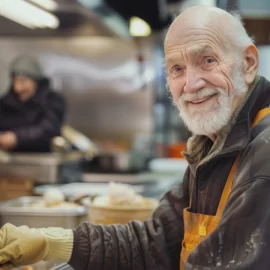

This article is an excerpt from the Shortform book guide to "The Things You Can See Only When You Slow Down" by Haemin Sunim. Shortform has the world's best summaries and analyses of books you should be reading.
Like this article? Sign up for a free trial here.
Looking for the top The Things You Can See Only When You Slow Down quotes? What can these quotes teach you about the value of mindfulness?
In his book, Zen Buddhist teacher Haemin Sunim reminds us to pause, breathe, and engage with the world from a place of mindfulness, compassion, and openness. By adopting practices that encourage us to slow down, we’re able to enhance our well-being, forge deeper connections, and find happiness.
Here are three quotes from the book with explanations.
Haemin Sunim‘s Quotes, Explained
Do you feel constantly busy and struggle to take time to rest? In The Things You Can See Only When You Slow Down, Zen Buddhist teacher Haemin Sunim examines this phenomenon and offers insights into why we feel continuously overwhelmed and how embracing slowness can lead to increased self-awareness and contentment.
Here are the top three The Things You Can See Only When You Slow Down quotes.
“We know the world only through the window of our mind. When our mind is noisy, the world is as well. And when our mind is peaceful, the world is, too. Knowing our minds is just as important as trying to change the world.”
According to Haemin, slowing down isn’t just about physically pausing—it’s also about deliberately shifting your mindset. He explains that to slow down, you must change your internal response to your external world. He suggests taking a more objective, observant stance in response to your environment, interactions, and thoughts. For example, instead of reacting emotionally to a challenging situation, you might step back to observe and analyze it dispassionately, noting details and patterns without immediate judgment. This shift not only enriches your experience of the world but also supports a more balanced and thoughtful approach to life.
“Love is trusting someone, being there for someone, being ready to listen with a tender heart for no other reason than love. At times we are not sure whether what we feel is love. At that moment, ask yourself this: “Am I happy to give more even after having given a lot?” If the answer is yes, and there is no regret afterward, then that is probably love.”
When you slow down, you’re better able to recognize the things that bring value to your life. For Haemin, nurturing connections and building relationships is key to finding happiness and understanding yourself. He believes that relationships are crucial because they offer a mirror through which we can see ourselves more clearly, highlighting both our strengths and areas for growth. They ground us, providing comfort during tough times and joy in the good ones while fostering a sense of belonging and community. Essentially, Haemin underscores that by connecting deeply with others, you remind yourself that you’re not alone but part of something bigger than yourself.
Haemin adds that to maintain strong relationships, you need to find a balance between intimacy and independence. Too much of either can lead to feelings of suffocation or isolation, respectively. For example, a parent who keeps their teenager on a very tight leash might think they’re being protective, but it can lead to the teen feeling stifled and craving independence. Or, on the flip side, giving the teen too much freedom without enough check-ins can leave them feeling neglected and unloved.
“There are many more ordinary hours in life than extraordinary ones. We wait in line at the supermarket. We spend hours commuting to work. We water our plants and feed our pets. Happiness means finding a moment of joy in those ordinary hours.”
Haemin argues that if you want to feel less busy, you need to intentionally slow down, which means living in the present moment. In doing so, he explains, you’re better able to observe, understand, and appreciate what you might otherwise overlook in the rush of daily commitments and challenges.
For example, consider a routine activity like commuting. Typically, when you commute, you’re focused on reaching the destination quickly (future thinking), leading to potential frustration or stress when you hit traffic or have to stop for gas. This mindset can result in overlooking details of the experience that could offer value or enjoyment.
By applying Haemin’s advice to slow down, the experience of the same commute changes. Taking the time to observe your surroundings, like noticing the way light filters through trees or observing the people around you, allows for a richer experience of the same journey. Slowing down not only changes what we notice but also affects our internal state, often leading to a more relaxed and positive mindset.

———End of Preview———
Like what you just read? Read the rest of the world's best book summary and analysis of Haemin Sunim's "The Things You Can See Only When You Slow Down" at Shortform.
Here's what you'll find in our full The Things You Can See Only When You Slow Down summary:
- Why we feel continuously busy and overwhelmed
- How embracing slowness can lead to increased self-awareness and contentment
- The importance of curbing your enthusiasm when pursuing your passion






